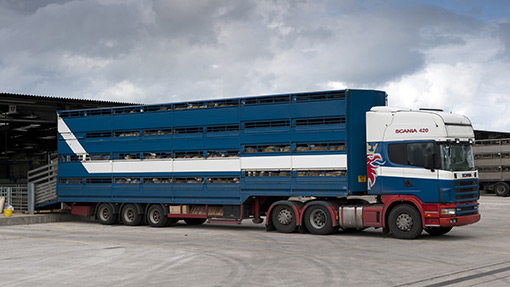Driver CPC qualification deadline looms for farmers

Drivers of C-category vehicles, such as livestock transports heavier than 3.5t, have just over a month to gain their CPC qualifications.
The Driver Certificate of Professional Competence (CPC) is a professional qualification separate from a driver’s licence.
It applies to drivers of vehicles with more than eight passenger seats, for example a D-category vehicle such as a minibus.
See also: Safety campaign launched as rural speed limit raised
Drivers of large goods vehicles (LGVs) over 3.5t – for example a C-category licence such as a livestock wagon – will also have to undergo training.
Who needs CPC?
- Example 1 – A farmer using an HGV to transport livestock to auction would need to meet the CPC qualification rules in order to legally operate his/her vehicle on public roads. The sale of cattle is directly related to a profit-making venture.
- Example 2 – A farmer using an HGV to transport the materials and equipment necessary to repair his/her fences would not be subject to the CPC qualification. Repairing fences is not directly related to his/her profit-making activities
- Example 3 – A farm labourer who routinely transports cattle and/or crops around the farm still needs CPC certification because he/she is carrying things that will eventually be sold for profit. If he/she only carries equipment and supplies, the CPC qualification does not apply.
The qualification applies to drivers of vehicles in the following categories: C1, C1+E, C, C or C+E.
European Union law states that drivers of lorries and minibuses who drive professionally throughout the UK, must obtain a CPC qualification.
The law was developed as a requirement of the EU Directive 2003/59, which is designed to improve the knowledge and skills of professional drivers throughout their life.
The deadline for minibus drivers passed on 9 September 2013. But for drivers of goods vehicles, which includes livestock, who wish to continue on a commercial basis, the deadline is 9 September 2014.
Drivers who do not complete their CPC training by this deadline will not be allowed to operate HGVs in any capacity directly related to making a profit.
Anyone who passed their lorry driving test (C1, C1+E,C or C+E licence) after 10 September must also pass the initial Driver CPC qualification to drive for a living.
Drivers who passed their truck test before 10 September 2009 are exempt from this qualification, due to “acquired rights”. But they still must complete 35 hours of training every five years in order to retain their licence.
However, the driver CPC qualification does not apply to those towing a livestock trailer behind a tractor or a 4×4, as these are driven on a different category of licence.
The NFU is disappointed that no exemptions were made in the legislation for farmers who only drive trucks or minibuses for a limited time.
Ben Ellis, NFU regulatory affairs adviser, said: “We think that this legislation is entirely unnecessary, inappropriate and just adds another burden to farmers that will provide little of no safety benefits.
“Thirty-five hours of training is not going to improve safety. It will simply encourage people to use different types of transport, which will increase congestion on rural roads because people will decide to use smaller trailers or 4x4s, rather than transporting things around much more efficiently in a livestock wagon.”
For further details, visit Gov.uk or for details on training courses near you see the NFU’s website .
